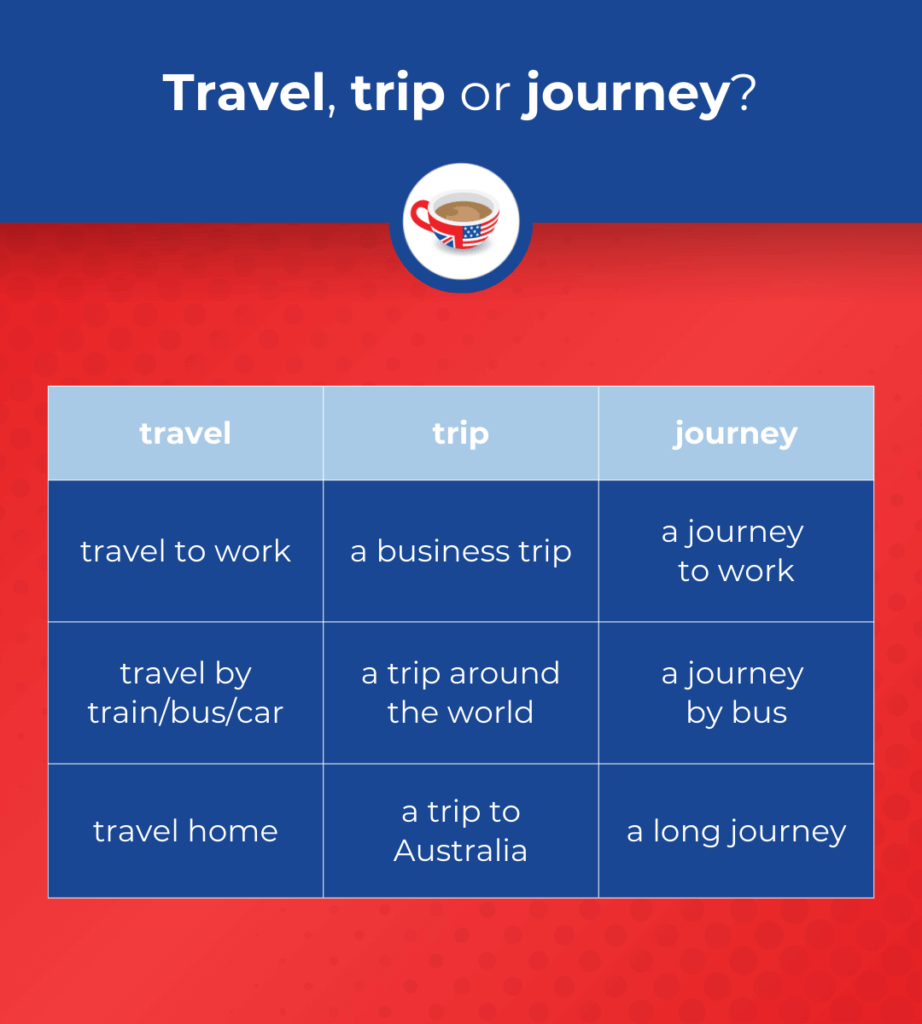Do you know the difference between the words travel, trip and journey? They all have similar meanings, so it’s easy to confuse them!
The Coffee Break English Show is a podcast series of bite-sized, friendly conversations to help you understand some difficult topics in English. In the latest episode, Mark and Josie talk about when to use travel, trip and journey correctly.
Continue reading to find out more and why not listen to the podcast as you go?
So, let’s get started and look at the words travel, trip and journey.
Travel
Travel is a verb. It describes the action of going to a place.
Here are some examples using travel:
They travelled to London by train.
I’m going to travel to Australia this summer.
Top tip: we can often replace travel with go.
Travel is usually a verb, but not always. The word travels describes the action of visiting different places, and we can replace it with adventures. We use travels in the expressions go on your travels and be off on your travels. For example:
Now that my daughter has finished high school, she’s off on her travels.
When are you going on your travels in Europe?
Journey
Journey is a noun. It describes the action of travelling from one place to another place. For example:
Mark’s journey to work takes 20 minutes.
I am exhausted after my long bus journey.
Have a safe journey home!
Trip
Like journey, trip is also a noun. It describes the process of travelling to a place, doing things in that place, and travelling back home again. We use trip in the expressions take a trip and go on a trip. For example:
She’s going on a business trip to Thailand.
We’re taking a trip to Greece this summer.
Let’s practise!
Now, let’s practise! Here are five sentences. Complete the spaces with travel, trip, or journey. The answers are at the end of this blog post, but don’t look until you’ve thought about the answers!
- I ___ to work by train.
- It was a really long car ___.
- I’d love to go on a ___ around the world.
- How long will the ___ to Rome take?
- My brother is on a work ___ this week.
Happy Coffee Breaking!
If you found this post interesting, make sure you listen to the full podcast episode with Mark and Josie on The Coffee Break English Show. We will release more episodes soon, about some more useful topics! Subscribe to our podcast feed and our channel on YouTube to learn when the next episode is available.
Plus! To get regular free English lessons in your inbox, you can sign up for our email lessons. We regularly send short (coffee-break-sized) email lessons that will help you improve your English. You will also hear from Mark, the founder of Coffee Break Languages, giving advice for language learners at any level. Sign up below!
So, keep practising when to use travel, trip, and journey! Remember that all English learners make mistakes, but people can usually still understand you. It’s all part of the language-learning journey.
Happy Coffee Breaking!
PS. Here are the answers to the questions:
- I travel to work by train.
- It was a really long car journey.
- I’d love to go on a trip around the world.
- How long will the journey to Rome take?
- My brother is on a work trip this week.




